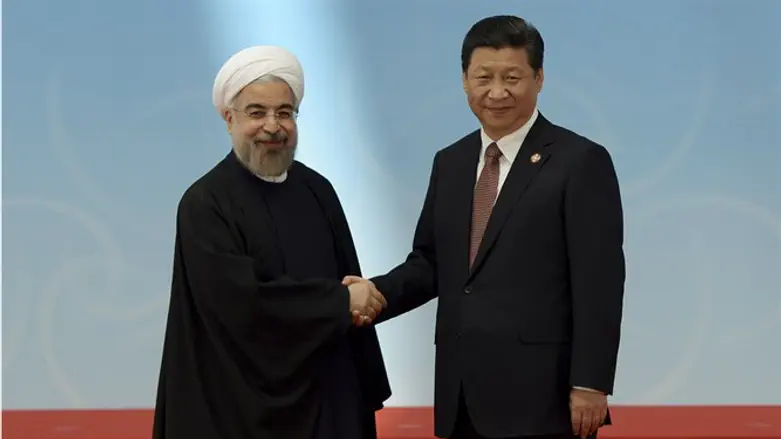
China and Iran reached a deal recently that will see approximately US$400 billion flow into the Persian nation over the next 25 years. That equals about $16 billion annually. All of the details of the agreement are not yet known, but it will involve investments in several sectors, including telecommunications, oil, gas, petrochemicals, railroads, banking, and harbors.
Iran has been hit hard by the pandemic and subsequent economic downturn, but it has also been struggling in light of U.S.-backed sanctions. Now, with China’s monetary aid, Iran will be able to skirt the sanctions and continue its reign as a sponsor and instigator of terrorism.
Iran has long been a nation bent on stirring up trouble, especially throughout the Middle East. It has continually called for the annihilation of Israel and funded terrorist groups and cells throughout Iraq, Syria, Lebanon, Palestine, and elsewhere.
In an effort to clamp down on Iran and its proxies, the nuclear agreement was signed in 2015. The agreement allowed the implementation of U.S. sanctions, limiting its economic viability and hindering Iran’s ability to purchase or sell weapons to its proxies. This was a bold move that helped to slow down Iran’s terrorist agendas. However, recently, the UN voted to lift the sanctions and from October, Iran will be able to overtly buy and sell weapons.
This surprising move by the UN means the money invested by China could very well end up supporting the ongoing attacks and assaults on military and civilian targets throughout the Middle East, and perhaps beyond.
How the Deal benefits China
A major benefit for China through this deal is the reduced cost of oil. It will now have the option of buying oil at a discount of $10.95 per barrel, while Iran will pay for the cost of transportation to ship the oil to China. In return, it will invest $16 billion annually into those sectors mentioned, and perhaps other areas as well. Before the pandemic, China was importing nearly half of all its oil from this region, and being able to get a significant discount per barrel will have long-lasting positive ramifications for its energy consumption.
Some might argue that this deal is the result of U.S. President Trump’s pressure on China and Iran, but it’s far more complex than that.
China seemingly remains more focused on the financial benefits that could be gained through positive relationships in the Middle East. The two nations have been relatively close historically, Iran is viewed as a strategic country to China’s infamous Belt and Road Initiative, and its leaders have visited each other’s countries on numerous occasions. However, the ramifications of this newly found financial partnership could be far-reaching, and potentially destructive.
Iran’s Stronger Port
Infrastructure investments, especially in port cities for countries like Saudi Arabia and the United Arab Emirates have helped to boost their economies, increasing the ability to transport goods, and bolster their presence in the global economy.
Now, this new agreement will likely do the same for Iran, and this isn’t good news for regional stability. In fact, while Iran’s Navy has antagonized the U.S. and other countries throughout the Strait of Hormuz, they may increase aggression as their infrastructure improves in the coming years.
Iran has been adamant about not becoming dependent on any other nation, but with these investments, that may not be the case for much longer. Beijing is being accused of taking advantage of a weakened Tehran, exploiting its economic struggles.
There have been long-running gripes among Iranians about the quality of Chinese products, but their low cost has been driving Iranian manufacturers out of business.
An Ongoing Threat
As China and Iran circumvent sanctions and continue to conduct business and investment opportunities behind closed doors, Middle Eastern countries will face exceptional threats. With the help of Chinese money, Iran will once again have the opportunity to fund Hezbollah, Hamas, Houthis, and other proxies.
Once China, as a superpower, has a strong vested financial stake in Iran, it will become that much more difficult for the West to impose sanctions and stop Iran from carrying out its proxy attacks. The Strait of Hormuz could very well see an increase in harassment from Iran, including the hijacking of ships.
China may have a public policy of not getting involved in the politics of the Middle East, but it’s clearly attempting to influence much of what transpires there. This latest deal will be a major thorn in the side of peace and progress for Israel, the UAE, Saudi Arabia, and any other nation that decides to stand for freedom, growth, and Western ideals.
Daniel Schwartz is a Melbourne-based junior lawyer who also write on topics related to Middle East politics.